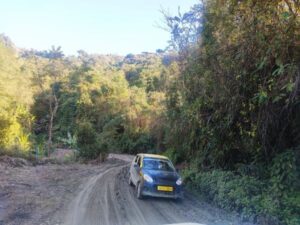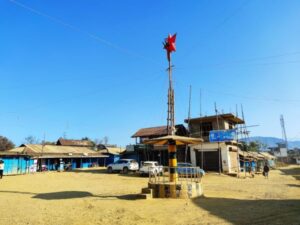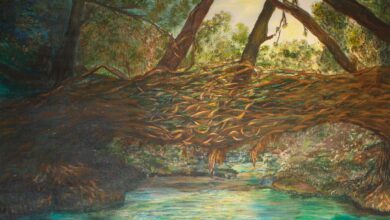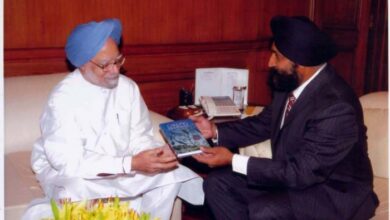Tales from Nagaland
A visitor shares his experiences travelling through the state. He takes two leaves out of his travel diary to tell the tales of adventure & gratitude as well as harassment & disappointment

Helping hand
The trek to Mt Saramati, the highest peak in Nagaland, is neither for the weak-hearted nor for an untrained trekker with passion but little fitness. I thought I was the second type until I attempted the trek and realised that I was never a braveheart. I never reached Saramati Peak. I only made it to the base camp and that too all thanks to my two friends and our guide, Yimrumong Yimchung.
Yimrumong is among the 12 guides who work for the Eco-tourism venture at Thanamir, the last Indian village along the Myanmar border. The 55-year-old guide has travelled widely and came back to his birthplace 26 years ago. Besides working as a guide, Yimrumong is also a village guard and is on the government’s payroll.
According to him, most of the tourists who visit Thanamir to scale Mt Saramati are from Nagaland. Before starting the trek, he warned us about the arduous journey. While villagers take four hours or less to reach the base camp, visitors cover the distance in double the time. In our case, it was more than triple and we could not reach the base camp before sunset. This meant that the difficult terrain became more gruelling, especially for me as I struggled with my balance and fatigue.

Until then, Yimrumong barely held out a helping hand. He watched me from a distance the entire time and his intermittent sighs at regular halts intimidated me. He repeatedly warned my friend that if we did not pick up speed, we would have to trek in the dark. But his warnings fell on deaf ears as I continued walking at a snail’s pace.
As the sunlight reduced, I panicked and that made me slower. This Yimrumong sensed and for the first time, he offered help. He asked me to follow him as I struggled to climb a steep rock. He took my bag and showed me light while constantly instructing me where the crevices were on the rock for a strong foothold. After reaching the top, he blatantly told me that I would not be able to cover the distance until I took his hand. I was waiting for help and without much ado grabbed Yimrumong’s hand. He guided me through the thickets and helped me jump the boulders. Not for once did he let my hand go. As my breathing got heavier, Yimrumong suggested that we take a break and sip water or eat a biscuit.
For two hours, I clung to him like a baby lost in the forest. He was no more intimidating. His strong grip was reassuring. When we reached the base camp, it was 10 pm and freezing. I was too tired to even lift a toe but my friends pushed me to stretch for 10 minutes before I sat down. After arranging our beds on the floor, we went up a mound where the kitchen was. The hut also served as a bedroom for the guide and the porters.
The dinner was simple — rice, dal and omelette— but was enough to warm the cockles of your heart, especially

after the long trek. By then, Yimrumong was familiar with my wobbly steps but he chose not to mention anything over dinner. But he suggested that we drop the plan to climb Mt Saramati the next morning and rest in the camp. We had already decided against climbing. My two friends were supportive enough to cancel their plan despite my insistence.
The next day was spent at the camp and we found comfort in the simple rice and dal cooked by Yimrumong. We prepared for the day after when we planned to go down to Thanamir. I panicked but Yimrumong continued to assure me that it would not be a difficult task. He was partially right. While I still wobbled, the seasoned guide continued to help me. He held my hand till the time we reached a point where I could manage to walk without help. We covered the distance from the base camp to the village in eight hours and that could be possible because of Yimrumong.
An outsider’s travails
If you are an ‘outsider’, a ‘foreigner’ or an ‘Indian’ from any part of the country other than Nagaland, and visiting Nagaland for the first time, then brace for a harrowing time. While transportation is a major problem, cooperation from the locals is barely there.
A visitor, who was unwilling to give his name, narrated to Meghalaya Monitor his travails in Nagaland. He said that not only state transport employees and private transport operators hassled him but several locals in some of the villages he visited gave him a tough time.
The following is a personal account of the journey:
I reached Dimapur on January 3 for personal work and stayed with a friend. On January 4, I booked a ticket for a bus run by Nagaland State Transportation (NST). I was travelling to Pungro village. The man at the counter gave a receipt where he mentioned that the departure time was 1 pm and the reporting time was 12 pm. However, a friend staying near ISBT informed me that the departure time was noon and I managed to reach the terminus in the nick of time.
How can an NST employee selling bus tickets give the wrong departure time? When asked, the man, who was one of the drivers, babbled something. The only reason for such behaviour would be that he was expecting that I would miss the bus and he would resell the seat to another passenger.
Also, earlier when I asked for a middle seat at the NST counter, the same man told me that the bus was full and he could only manage a seat at the back. But when I boarded the bus, it was nearly empty. Luckily, the conductor offered me a decent seat.

Initially, I was told by the same NST employee that the bus would reach Pungro at 8 am the next day. I did not have a booking in any guest house and thought I would book a room after reaching Pungro in the morning. I had a friend at Pungro whom I informed that I would reach the place at 8 am. However, the bus reached Pungro around 3 am. Again, when I asked the man why he gave me the wrong time and what would I do in an unknown place at this ungodly hour, he babbled something and did not even say clearly exactly where I should get down. I lost my temper and demanded an answer. The man suggested that I get down at the last stop, which was the town marketplace.
I wondered how an employee of the state transportation section who drives the bus to the destination does not know the timings and would not care to find out instead of confidently misleading a passenger.
I stayed at Pungro for a day before heading to Thanamir where I spent three days. After much bargaining, I paid Rs 3,500 to hire a Sumo vehicle to reach Thanamir. The driver seemed friendly. So, I thought of contacting the same driver on my return journey. He picked me up from Thanamir. I did not ask him, which was a mistake that I realised in retrospect, the car rental because the distance was the same.
However, after reaching Pungro, the driver asked for Rs 6,000. When I confronted him, he said he had to go to Thanamir without passengers. When I pointed out that he did the same while returning from Thanamir three days back, he just shrugged and said, “Whatever, you have to pay Rs 6,000.”
After a long argument, I finally paid him Rs 5,000.
Fleecing tourists is not new in our country. But here, I did not know where to complain or seek help from. Nagaland is another beautiful state in the North East and the state government has put up hoardings, which I spotted in Dimapur, publicising its tourism. But it has barely taken any measure to make the place tourist-friendly. It will be helpful if the authorities make efforts to train locals in dealing with tourists and set up kiosks at tourist sites which can play the dual role of an information centre and a grievance redressal cell.
Photos by the author




